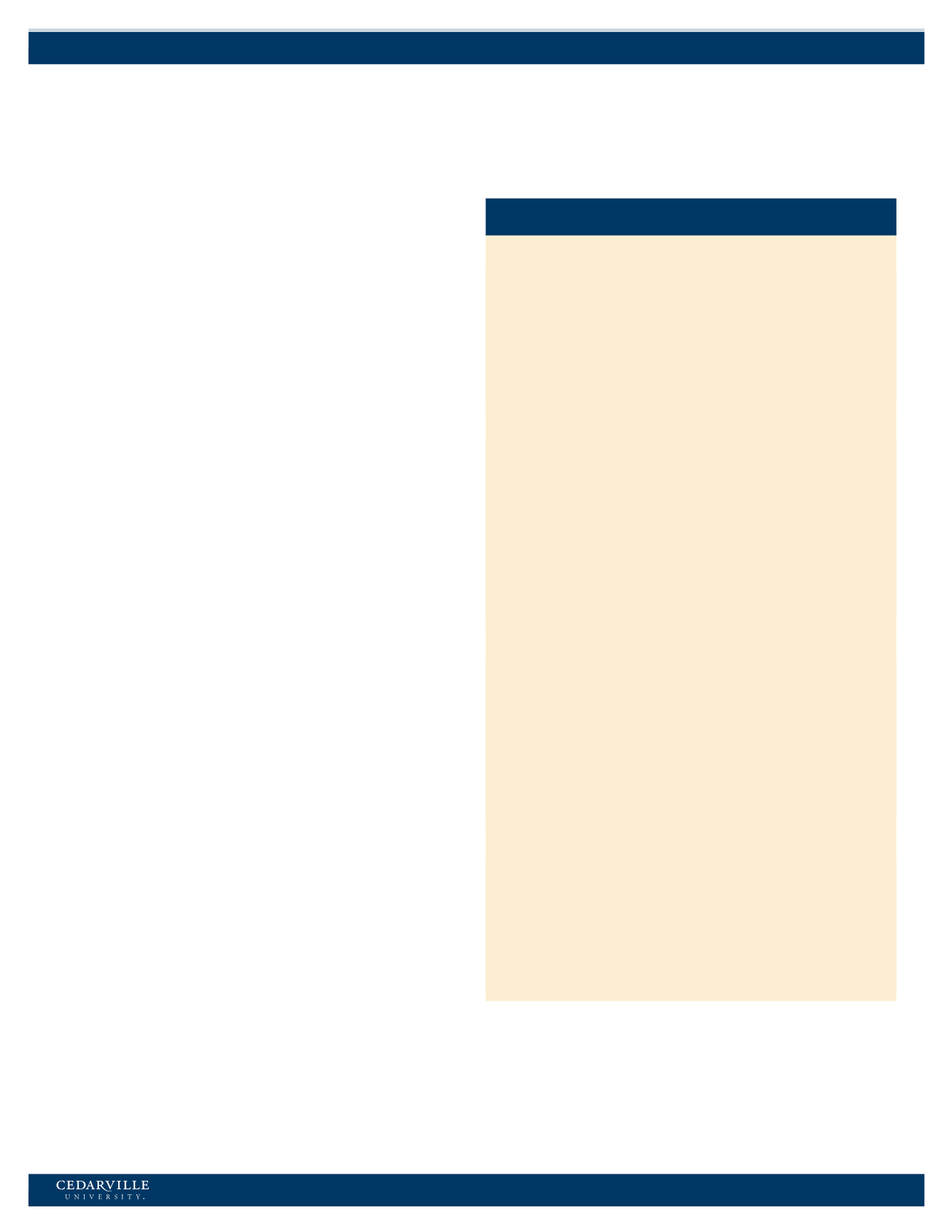

Chemistry Education (B.A.) Summary
Proficiency Requirements. .........................................................0–5
General Education Requirements..........................................38–46
Chemistry Education Major Requirements. ..............................55.5
Teacher Education Requirements................................................41
Total (minimum, not including proficiency)........................ 134.5
A complete description of the general education requirements is found on
page 24.
Suggested Four-Year Curriculum for a
Major in Chemistry Education
First year:
BTGE-1720 Spiritual Formation.........................................................3 CHEM-1010 Principle of Biochemistry. ..............................................5 CHEM-1110, 1120 General Chemistry I and II....................................8 COM-1100 Fundamentals of Speech.................................................3 EDUC-1000 The Education Profession..............................................2 EDUC-1050 Preliminary Student Involvement. ..................................0 ENG-1400 Composition.....................................................................3 GBIO-1000 Principles of Biology.....................................................3.5 MATH-1710 Calculus I........................................................................5Total.............................................................................................. 32.5
Second year:
BTGE-2730 Old Testament Literature................................................3 CHEM-2210 Analytical Chemistry I....................................................3 CHEM-2800 Introduction to Research in Chemistry..........................1 EDSP-2000 Teaching Children with Exceptionalities.........................1 EDSP-2050 Field Experience: Exceptional Learning Needs..............1 EDUC-2000 Introduction to Diverse Learners....................................2 EDUC-2100 Technology in the Classroom.........................................2 EDUC-2200 Multicultural Field Experience........................................1 EDUC-2500 Educational Psychology.................................................3 GSS-1100 Politics and American Culture...........................................3 PHYS-1010, 1020 College Physics I and II....................................... 10LIT-2XXX Literature Elective..............................................................3
Total................................................................................................. 33
Third year:
BTGE-2740 New Testament Literature...............................................3 BTGE-3755 Theology I......................................................................3 BTGE-3765 Theology II. ....................................................................3 CHEM-3210 Environmental Chemistry..............................................4 CHEM-3410 Inorganic Chemistry......................................................3 CHEM-3510, 3520 Organic Chemistry I and II...................................8 EDUC-3200 Faith and Learning Alignment........................................1 HUM-1400 Introduction to the Humanities.........................................3 SCED-3110 Clinical Teaching in Science...........................................1 SCED-3120 Teaching Science for Adolescent and Young Adult.........3 PEF-1990 Physical Activity and the Christian Life..............................2Total................................................................................................. 34
Fourth year:
CHEM-4800 Senior Seminar — Chemistry. ......................................1 EDSE-4000 Reading in the Content Area: AYA..................................3 EDSE-4100 Principles of Teaching.....................................................5 EDSE-4450 Adolescent/Young Adult Clinical Experience..................3 EDSE-4900 Student Teaching and Seminar: AYA............................ 12 EDSP-4250 Communication, Collaboration and Inclusion.................2 EDUC-3100 Philosophical Foundations of Education........................3History Elective..................................................................................3
Social Science Elective......................................................................3
Total................................................................................................. 35
Teacher Education Licensure Programs
Adolescent andYoung Adult
The Department of Science and Mathematics joins with the
School of Education to offer adolescent/young adult licensure
programs in the following areas:
• Chemistry
• Life Science
• Mathematics – Integrated
• Physical Science
• Physics
• Science Comprehensive – Integrated
The course requirements for each licensure field are outlined
under each major. However, the following courses are common to
all adolescent/young adult majors in this department:
Teacher Education ....................................................................41
EDSE-4000 Reading in the Content Area: AYA......................... 3 or EDUC-4000 Reading in the Content Area: AYA Math Educ 3 EDSE-4100 Principles of Teaching............................................ 5 EDSE-4450 Adolescent/Young Adult Clinical Experience......... 3 EDSE-4900 Student Teaching and Seminar: AYA................... 12 EDSP-2000 Teaching Children with Exceptionalities. ............... 1 EDSP-2050 Field Experience: Exceptional Learning Needs..... 1 EDSP-4250 Communication, Collaboration and Inclusion........ 2 EDUC-1000 The Education Profession..................................... 2 EDUC-1050 Preliminary Student Involvement........................... 0 EDUC-2000 Introduction to Diverse Learners........................... 2 EDUC-2100 Technology in the Classroom................................ 2 EDUC-2200 Multicultural Field Experience............................... 1 EDUC-2500 Educational Psychology........................................ 3 EDUC-3100 Philosophical Foundations of Education............... 3 EDUC-3200 Faith and Learning Alignment............................... 1Specific information regarding admission to the Teacher
Education Program and course descriptions is located in the
School of Education section
(page 79).
Chemistry Education
(Bachelor of Arts)
The
chemistry education major
prepares students to engage
the culture as chemistry teachers in the middle school and high
school setting, in both public and private institutions. The goal of
the program is to prepare future educators with a heart for Christ
and a high view of God’s Word.
Course requirements involve 94.5 semester hours including:
Chemistry Core Requirements. .............................................55.5
CHEM-1010 Principles of Biochemistry..................................... 5 CHEM-1110, 1120 General Chemistry I and II........................... 8 CHEM-2210 Analytical Chemistry I........................................... 3 CHEM-2800 Introduction to Research in Chemistry................. 1 CHEM-3210 Environmental Chemistry..................................... 4 CHEM-3410 Inorganic Chemistry. ............................................ 3 CHEM-3510, 3520 Organic Chemistry I and II.......................... 8 *CHEM-4800 Senior Seminar — Chemistry............................. 1 GBIO-1000 Principles of Biology............................................ 3.5 MATH-1710 Calculus I............................................................... 5 PHYS-1010, 1020 College Physics I and II.............................. 10 SCED-3110 Clinical Teaching in Science.................................. 1 SCED-3120 Teaching Science for Adolescent and Young Adult.3Teacher Education.....................................................................41
*Capstone Course
Page
179
2015–16 Undergraduate Academic Catalog
DepartmentofScienceandMathematics
TeacherEducationLicensureProgramsAdolescentandYoungAdult



















